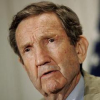Ramsey Clark

Ramsey Clark
William Ramsey Clarkis an American lawyer, activist and former federal government official. A progressive, New Frontier liberal, he occupied senior positions in the United States Department of Justice under Presidents John F. Kennedy and Lyndon B. Johnson, notably serving as United States Attorney General from 1967 to 1969; previously he was Deputy Attorney General from 1965 to 1967 and Assistant Attorney General from 1961 to 1965...
NationalityAmerican
ProfessionPublic Servant
Date of Birth18 December 1927
CountryUnited States of America
We will be back in court on December 5 and we will demand protection of the counsel.
What was the government doing? What's the meaning of this?
What was the government doing? ... (FBI agents) had absolutely no regard of the lives of any of the people in there. All they had to do was wait them out.
Nearly two months after the brutal execution of one of their members and the summary execution of a second lawyer, and all this time these men and their families have been left essentially unprotected.
I've been in many unpopular cases where there's been high community prejudice against the defendants, but here everybody has been hurt, and everybody is angry,
The statutes of the high court in Iraq requires a public hearing but he (the presiding judge) arbitrarily cut it off so that you the press and the rest of the world could not see what he said.
President Saddam Hussein was in very good spirits, very clear minded. We had a good discussion after the court.
Cutting off the president (Saddam) was absolutely unwarranted. He has international rights to a public trial.
A fair trial in this case is absolutely imperative for historical truth.
There will be motions made in court to enlist its support for a thorough investigation. It was selective violence calculated to destroy the ability of the defense to present its defense,
The whole environment in the country is so violent and threatening it's impossible for it to function.
This case presents as great a challenge of the possibility of a fair trial as any you're likely to see because the emotions are so intense,
We never thought we couldn't come back in. The fundamental right to counsel is the right to counsel of choice, not to somebody else's choice.
If the orders came from higher officials then you have a real problem. I don't see how you go forward with a trial,